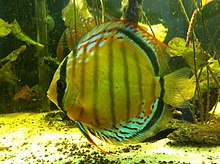Symphysodon tarzoo, the green discus, is a species of cichlid endemic to Brazil; specifically, to rivers of the western Amazon Basin upriver from the Purus arch, although it occasionally occurs downstream.[1][2] An introduced population in the Nanay River is based on stock from the Tefé region.[3] The green discus is found in blackwater habitats with a high temperature of 27–30 °C (81–86 °F) and low pH of 4.8–5.9.[3] Although also known from whitewater, its preference for lentic habitats such as floodplains means that the water contain little suspended material (unlike main sections of whitewater rivers).[2][4]
| Green discus | |
|---|---|

| |

| |
| Individuals from Nanay (above) and Japurá Rivers (below) | |
| Scientific classification | |
| Domain: | Eukaryota |
| Kingdom: | Animalia |
| Phylum: | Chordata |
| Class: | Actinopterygii |
| Order: | Cichliformes |
| Family: | Cichlidae |
| Genus: | Symphysodon |
| Species: | S. tarzoo
|
| Binomial name | |
| Symphysodon tarzoo Lyons, 1959
| |
This species grows to a length of 13.2 centimetres (5.2 in) SL.[1][5] S. tarzoo has red spots on the anal fin and body, which separates it from other discus species.[6]
The scientific name was coined by Earl Lyons in 1959, and the species was revalidated by pattern, morphology and mtDNA in 2006.[1][6] Later studies have confirmed its distinction, although some suggest the correct scientific name for the green discus is S. aequifasciatus (a name typically used for the blue/brown discus).[2][3] No natural (wild) hybrids are known between the green discus and its relatives.[1][3]
References edit
- ^ a b c d Ready, J.S.; Ferreira, E.J.G.; Kullander, S.O. (2006). "Discus fishes: mitochondrial DNA evidence for a phylogeographic barrier in the Amazonian genus Symphysodon (Teleostei: Cichlidae)". Fish Biology. 69: 200–211. Bibcode:2006JFBio..69S.200R. doi:10.1111/j.1095-8649.2006.01232.x.
- ^ a b c Amado, M.V.; Farias, I.P.; Hrbek, T. (2011). "A Molecular Perspective on Systematics, Taxonomy and Classification Amazonian Discus Fishes of the Genus Symphysodon". International Journal of Evolutionary Biology. 2011: 360654. doi:10.4061/2011/360654. PMC 3147135. PMID 21811676.
- ^ a b c d Bleher, H.; Stölting, K.N.; Salzburger, W.; Meyer, A. (2007). "Revision of the genus Symphysodon Heckel, 1840 (Teleostei: Perciformes: Cichlidae) based on molecular and morphological characters". Aqua. 12: 133–174.
- ^ Crampton (2008). "Ecology and life history of an Amazon floodplain cichlid: the discus fish Symphysodon (Perciformes: Cichlidae)". Neotrop. Ichthyol. 6 (4): 599–612. doi:10.1590/S1679-62252008000400008.
- ^ Froese, Rainer; Pauly, Daniel (eds.) (2017). "Symphysodon tarzoo" in FishBase. January 2017 version.
- ^ a b "New Discus named Symphysodon tarzoo". Matt Clarke. practical fishkeeping. 2006-11-28. Archived from the original on March 7, 2009. Retrieved 15 August 2009.